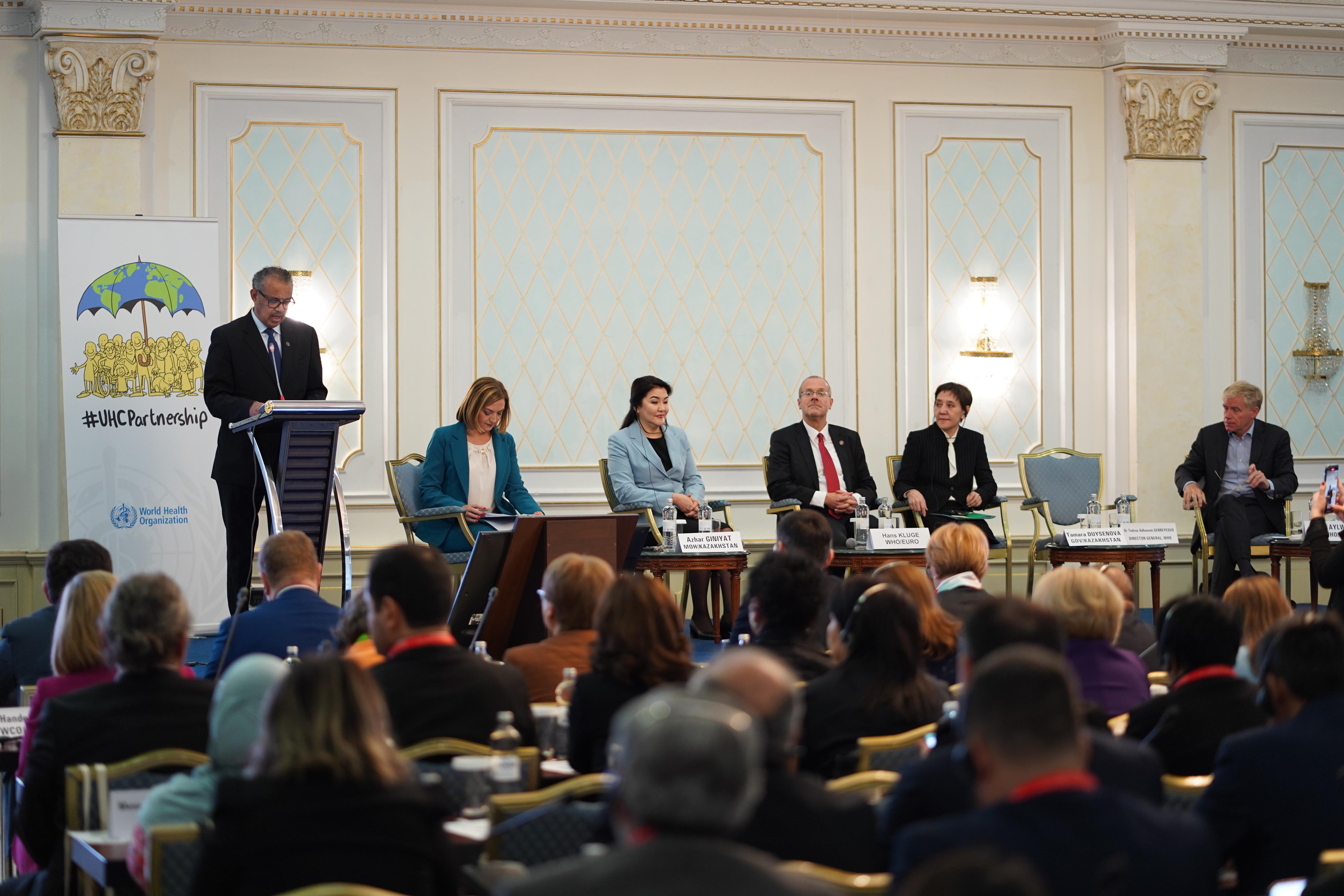ASTANA, Kazakhstan—On 22 October, the World Health Organization’s (WHO) largest platform for international cooperation on universal health coverage (UHC)—the UHC Partnership—hosted a forum for countries to examine the connections between primary health care and UHC, the political dynamics surrounding health system reforms, and success factors that enabled innovation and investment for primary health care (PHC) for better implementation in the immediate future. The event gathered nearly 300 delegates from about 40 countries.
In his welcome remarks, Dr Tedros Adhanom Ghebreyesus, WHO Director-General highlighted the role of the UHC Partnership in achieving the Organization’s General Programme of Work, “Twelve years ago, WHO joined with Member States and other agencies and organizations - many of you are here today - to create the UHC Partnership. The UHC Partnership has strengthened WHO's capacity in line with the transformation process I initiated several years ago to focus on country impact,” he said.
The Director-General also cited that supporting countries to radically reorient their health systems towards PHC is one of WHO's core priorities, further explaining that, “We are not starting from scratch. Through the UHC Partnership, we have already been doing that for more than a decade.”
The UHC Partnership event served as a pre-conference workshop ahead of the PHC International Conference on 23 October, titled "Primary health care policy and practice: implementing for better results." Both events marked the 45th anniversary of Alma-Ata and 5th anniversary of Astana declarations—affirming health as a fundamental human right and hailed PHC as key to the attainment of UHC.
Meeting highlights
Representatives from WHO Member States, WHO regional and country offices and development partners contributed to rich discussions on managing the politics of PHC reforms and country experiences related to advancing the UHC and PHC agenda. These are the key insights from the meeting:
- There is a strong high-level political commitment to PHC and UHC, to ensure health services are reaching people most in need, in a complex global health environment.
- If the UHC index is progressing, more efforts are requested to reach the SDG 3 targets by 2030, especially with regards to financial protection.
- The UHC Partnership is a powerful and unique platform for channeling strategic and technical assistance from WHO and partners and reorient health systems toward PHC.
- The diversity of country experiences demonstrates the need to ensure flexible and tailored support to countries.
- Health system reforms and implementation are rooted in political economy processes related to distribution of power and wealth.
- Heath politics is key to understanding how to reorient health systems, especially with regards to leadership, financing, stakeholder collaboration or beneficiary for instance.
- Policy dialogue led by the UHC Partnership and social participation can be instrumental in transforming the political economy of PHC reforms.
- There is a strong need to improve the demonstration of impact of multisectoral PHC for UHC policies.
- Noncommunicable diseases must be integrated at the primary care level.
- Essential Public Health Functions are critical to enhance health systems orientation toward PHC and their resilience.
These issues will inform the strategic agenda of the UHC Partnership going forward, which in turn will contribute to WHO’s 14th General Programme of Work.
A global technical meeting will be organized by the UHC Partnership n 2024. It will present an opportunity for countries to take stock of approaches and progress on PHC and UHC.
About the UHC Partnership
The UHC Partnership is one of the core components of the WHO Special Programme on Primary Health Care. It was created by WHO and its development partners in 2011 to bridge the gap between global commitments on UHC and country implementation, by providing the technical expertise needed to reinforce the leadership of the ministries of health in building equitable, resilient and effective health systems based on primary health care. Today, more than 145 health policy advisers are in the field working with WHO offices, national authorities and partners to foster policy dialogue and support countries in a wide range of areas including strategic planning, health governance, harmonization and alignment, health financing, health workforce, medicines and medical products, vaccines, gender, equity, human rights, mental health, noncommunicable diseases, among others.
The UHC Partnership in operates in over 125 countries, representing over 3 billion people. It is supported and funded by WHO, the European Union, the Grand Duchy of Luxembourg, Irish Aid, the French Ministry for Europe and Foreign Affairs, the Government of Japan, the United Kingdom - Foreign, Commonwealth & Development Office, Belgium, Canada and Germany.
